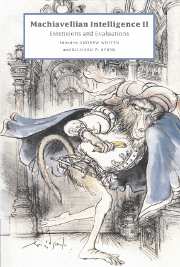Book contents
- Frontmatter
- Contents
- Contributors
- Preface
- 1 Machiavellian intelligence
- 2 Friendships, alliances, reciprocity and repair
- 3 Why Machiavellian intelligence may not be Machiavellian
- 4 Social intelligence and success: Don't be too clever in order to be smart
- 5 Minding the behaviour of deception
- 6 The Machiavellian mindreader
- 7 Exploiting the expertise of others
- 8 Primates' knowledge of their natural habitat: As indicated in foraging
- 9 Evolution of the social brain
- 10 The modulatory of social intelligence
- 11 The Technical Intelligence hypothesis: An additional evolutionary stimulus to intelligence?
- 12 Protean primates: The evolution of adaptive unpredictability in competition and courtship
- 13 Egalitarian behaviour and the evolution of political intelligence
- 14 Social intelligence and language: Another Rubicon
- Index
5 - Minding the behaviour of deception
Published online by Cambridge University Press: 23 November 2009
- Frontmatter
- Contents
- Contributors
- Preface
- 1 Machiavellian intelligence
- 2 Friendships, alliances, reciprocity and repair
- 3 Why Machiavellian intelligence may not be Machiavellian
- 4 Social intelligence and success: Don't be too clever in order to be smart
- 5 Minding the behaviour of deception
- 6 The Machiavellian mindreader
- 7 Exploiting the expertise of others
- 8 Primates' knowledge of their natural habitat: As indicated in foraging
- 9 Evolution of the social brain
- 10 The modulatory of social intelligence
- 11 The Technical Intelligence hypothesis: An additional evolutionary stimulus to intelligence?
- 12 Protean primates: The evolution of adaptive unpredictability in competition and courtship
- 13 Egalitarian behaviour and the evolution of political intelligence
- 14 Social intelligence and language: Another Rubicon
- Index
Summary
Introduction
In the pain of his passion, Cyrano de Bergerac fed Christian a suite of elegantly crafted lines designed to capture Roxanne's heart. Cyrano's act was clearly deceptive. Christian knew that he was being deceptive, but did not know the basis for Cyrano's apparent act of generosity. And then there is Roxanne, who believes that the handsome Christian is a poetic spirit able to weave verse that strikes at the heart. She is, of course, deceived. Here then, in one triadic interaction, we have Cyrano who knowingly deceives and does so on the basis of his knowledge of what Christian and Roxanne believe and desire. We have Christian who deceives by both withholding information about his lack of eloquence and actively falsifies information by making Roxanne believe that what emerges from his lips are true inspirations from the heart. And Roxanne is our gullible recipient, swept off her feet by Christian's ersatz performance.
Humans perform such complex mental acrobatics all the time, at least those humans who are over the age of about 4 years old and have all of their species-typical neural faculties intact. Is it even reasonable to contemplate the possibility that non-human animals are similarly endowed, to lie, cheat and conceal valuable information from other group members? In this chapter, I wish to accomplish at least three things along the way to answering this question. Firstly, I will discuss several conceptual issues that are relevant to thinking about the origins and subsequent evolution of not only deceptive behaviour, but a mental capacity for deception.
- Type
- Chapter
- Information
- Machiavellian Intelligence IIExtensions and Evaluations, pp. 112 - 143Publisher: Cambridge University PressPrint publication year: 1997
- 34
- Cited by

